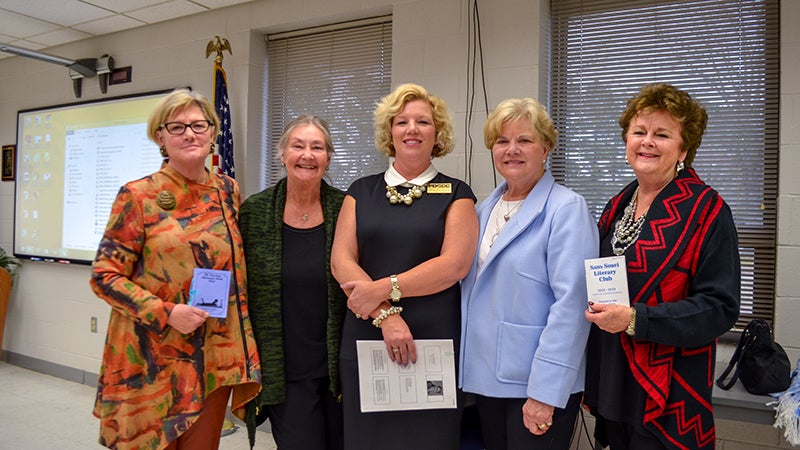The spiritualist who demanded change
Published 10:01 pm Thursday, February 21, 2019

- Suffolk’s Tuesday Afternoon Book Club and Sans Souci Literacy Club enjoyed a presentation on Victoria Woodhull by Paul D. Camp Community College history instructor Wendy Miller-Edwards. Pictured are Tuesday Afternoon Book Club president Charlotte Parr and vice president Cindy Ferguson, Miller-Edwards and Sans Souci Literacy Club president Linda Drummond and vice president Mary Anne Riddick.
An annual joint meeting between Suffolk’s Tuesday Afternoon Book Club and Sans Souci Literacy Club featured a presentation on the fascinating life behind the first United States presidential bid by a woman.
Members of both clubs met on Tuesday afternoon at the Paul D. Camp Community College Hobbs Suffolk Campus and learned about Victoria Woodhull, an American leader of the women’s suffrage movement who ran for president in 1872.
The presentation, conducted by PDCCC history instructor Wendy Miller-Edwards, was a stunning exploration of Woodhull’s life, according to Linda Drummond, president of the Sans Souci Literacy Club.
“I think many of us knew the name, but we didn’t know the depths of her intelligence (and) her quest to get women the vote,” Drummond said.
“Vicky,” as Miller-Edwards called her in the presentation, was a striking woman with a voice that could easily carry through a room. Her beliefs stood in contradiction to the norms of her time, and although she was married three times, she professed her belief in “free love.”
She was also devout spiritualist, going back to her difficult upbringing. Woodhull was born on Sept. 23, 1838 to Reuben “Buck” Claflin and Roxanne “Annie” Hummel. Buck was “a one-eyed snake oil salesman” who pretended to be a doctor and a lawyer in various scams throughout his life, while Annie was deeply religious and claimed to be a clairvoyant, which she spouted repeatedly in her ramblings.
Miller-Edwards emphasized the importance of spiritualism in this time period. Millions around the world during the late antebellum and Victorian eras considered themselves spiritualists, and the movement was an exciting opportunity for intelligent women that refused their roles as “silent partners” in society.
Woodhull and her sister, Tennie, were used by their father in spiritualism shows and private readings. Woodhull had her mother’s photographic memory, and she and her sister became convinced that they were clairvoyant.
It was through spiritualism — in which women could have a say — that Woodhull found her voice.
“I think it gave her an outlet for her voice,” Miller-Edwards said. “I think it kept her from being silent, which most of the religions at the time would have required her to be. I think it also gave her the freedom to share her views through her seances.”
Her talents carried her to celebrity status alongside her sister. Her memory helped her, first as an actress and then as a lecturer in the spiritualist circuit. It was through her talents as a spiritualist and a healer that she found Col. James Harvey Blood.
He was a believer as well, and she “saw” that they were destined to be married during one of her “trances.” They were married in 1866, her second husband after Canning Woodhull.
Victoria and Tennie became the “bewitching brokers” through a friendship with Commodore Vanderbilt, one of the wealthiest men in the United States at the time. The sisters opened the Woodhull, Claflin, and Co. brokerage house in 1870 and managed to make more than $700,000 speculating on the stock market before the Great Crash of 1870.
The sisters said it was a necessity for women to have “a knowledge of financial matters” and how to earn a living.
“There are a few of the ‘small potatoes’ sort of men, who never mention the name of any woman, not even their own mother, with respect,” the sisters are quoted saying in the presentation. “Who sneer, and try to get off their poor jokes on us, but it doesn’t hurt us … we shall soon be part of the machinery.”
Victoria announced her presidential bid later in 1870, and she and Tennie started their own newspaper, “the Woodhull and Claflin Weekly.” In January 1871, she became the first woman ever invited to speak to a Congressional Committee, where she made an impression on Congressman Benjamin Butler.
“Once she became a celebrity she started mingling with the very wealthy like Vanderbilt, and the very well-connected like Benjamin Butler,” Miller-Edwards said. “Her spiritualism gives her this platform to become the celebrity that she does become, and then of course the brokerage firm, the newspaper, the presidential bid — all of that comes from that.”
Her bid fell short due to various pitfalls, including the Rev. Henry Ward Beecher, a wealthy and prominent pastor whose political connections stymied Woodhull’s efforts. This was after a public back-and-forth in the press that included remarks on Beecher’s adulterous ways, both inside and out of his congregation.
But Miller-Edwards highlighted in her presentation Woodhull’s ceaseless determination that pushed her through obstacles: how she educated herself after a childhood that did her no favors, how she was able to reinvent herself for success and how she championed the underdog.
“She was looking for the underdog,” Miller-Edwards said. “She was looking for fair and equal pay. She was looking for an eight-hour workday. She was an abolitionist (and) a women’s rights suffragist. She was looking for people that didn’t have the same opportunities, and she wanted them to have that.”





